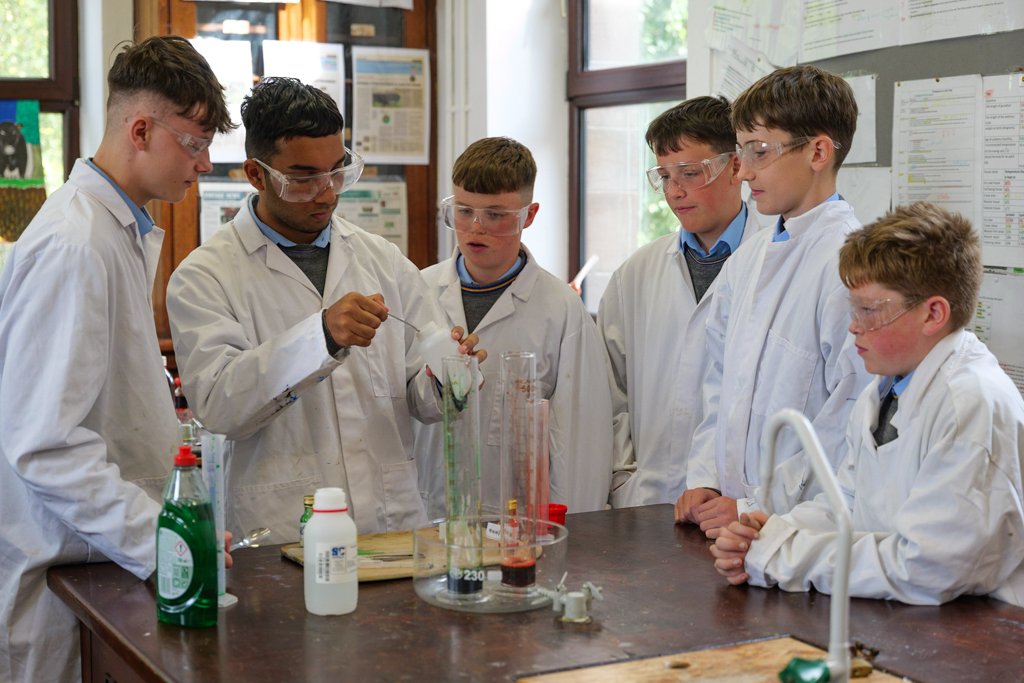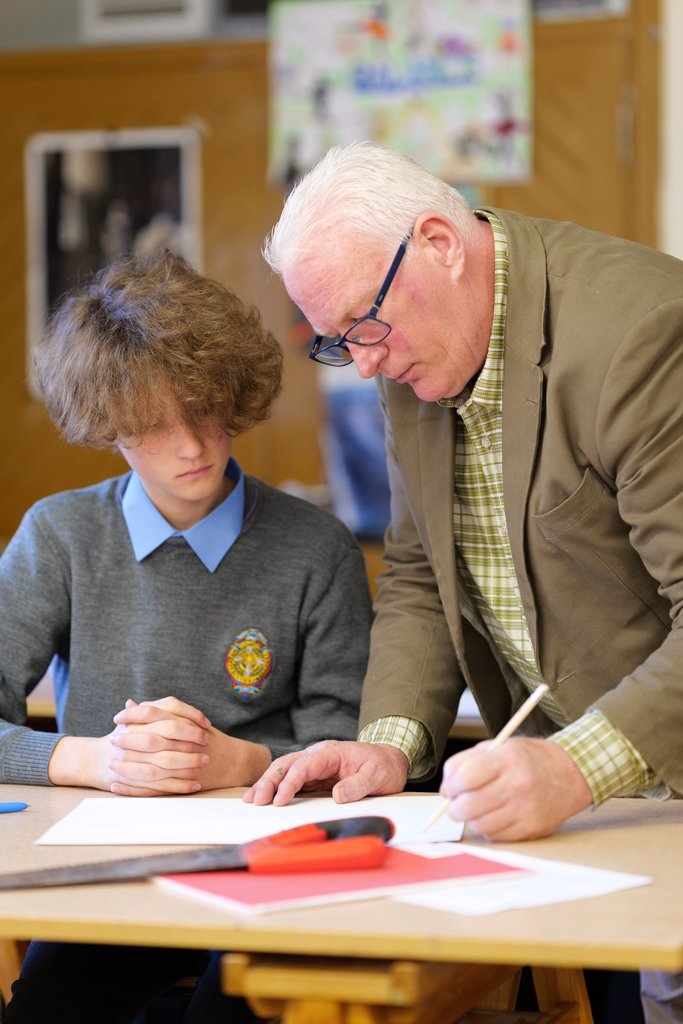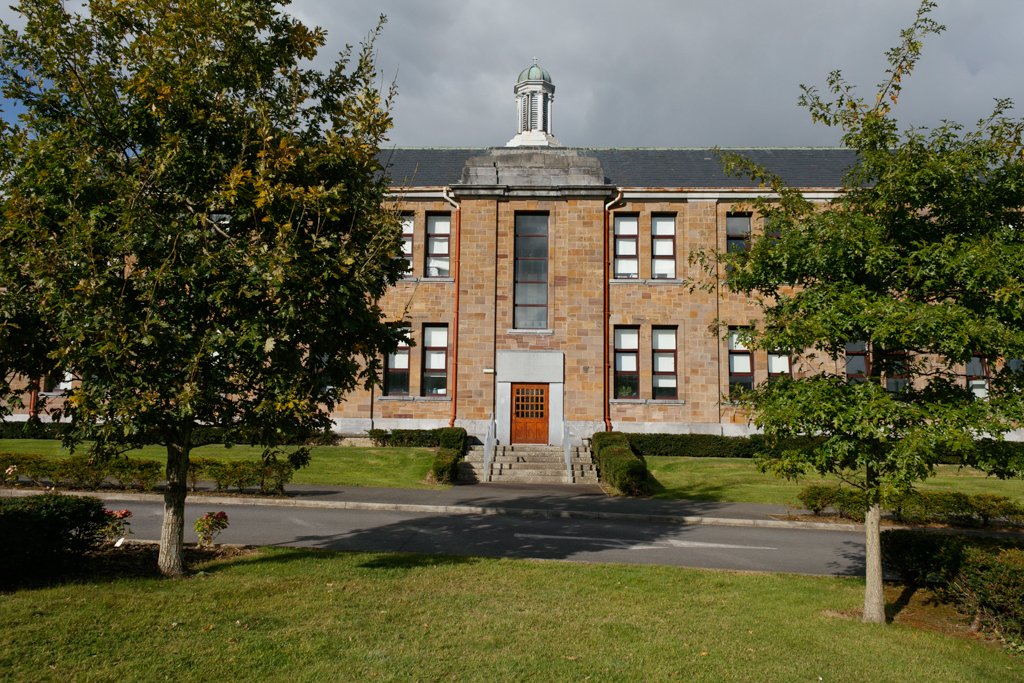
Learn more about our Junior Cycle Program
Junior Cycle
Junior Cycle Curriculum
All junior cycle students study subjects leading to the Junior Cycle Profile of Acheivment, the examination, taken at the end of third year. While a majority of subjects are assessed as part of the Junior Cycle Examination, the junior cycle provision also includes a number of subjects that are integral to the curriculum, but are not formally assessed in this way. The inclusion of these subjects in the curriculum ensures that students receive a broad, balanced education that introduces them to all the areas of experience relevant to the needs of learners at this age and stage of their development. non-examination subjects at junior cycle include Physical Education, Social, Personal and Health Education and Civic, Social and Political Education.
Junior Cycle Subjects
Core Subjects:
Irish, English, Mathematics, History, Geography, Science, Religious Education.
Non Exam Subjects
Civic Social and Political Education, Social Personal & Health Education, Physical Education.
Elective Subjects
French and German, Business, Graphics, Wood Technology, Technology, Visual Art.
Subject Information
-
Based on Learning outcomes, the course starts in 1st year and continues through to Leaving Cert. During that time students will learn new visual skills, problem solving techniques, through the three distinct strands of Art, Craft and Design... Art History is also part of the experience...involving looking and analysing artworks in today’s world, as well art from Europe and Ireland.. from the distant past to present. The Art course has evolved over the past years..and is now more about experimentation and exploration using themes and words ..and it is through these themes and words..that the child explores in an imaginative and visual way their own distinct take on the world they live in.
The Art course is an exciting and provides a most useful and important approach in their studies, that any student could undertake, as they prepare for life and the ever changing world of their future.
-
At CBS The Green, we believe that the world is our classroom, and geography is the key to unlocking its mysteries. Our passionate and dedicated geography department is committed to inspiring a lifelong love for the planet and its diverse landscapes, cultures, and ecosystems.
Through engaging lessons, hands-on activities, and immersive field trips, our students embark on a journey of discovery that transcends the boundaries of the classroom. Geography students have embarked on local field trips to Crag Caves, The Burren and Giant’s Causeway as well as conducting field investigations at river and coastal locations. These are successful methodologies used in our classrooms which are evident in our results. The results received by the Higher Level Leaving Certificate students of 2023 were higher than the national average and has been consistent for the previous three years.
-
CSPE stands for Civic, Social and Political Education. It is a core pillar of the Wellbeing programme within Junior Cycle as it enables students to grow in awareness of how their well-being is connected to the well-being of others, both locally and globally.
It is taught as a Short Course within the Junior Cycle. Short courses are curriculum components in the Junior Cycle which require 100 hours of student engagement and emphasise students' active learning.
The subject is activity-based, with students needing to carry out citizenship actions across three areas of learning: Rights and Responsibilities, Global Citizenship, and Exploring Democracy.
Assessment is school-based in the form of a Classroom Based Assessment which can be completed in 2nd or 3rd Year.
Further information can be found on the CSPE Short Course Specification here
SPHE stands for Social, Personal and Health Education. It is a core pillar of the Wellbeing programme within Junior Cycle as it provides a unique space where students can develop the knowledge, understanding, skills, dispositions and values needed to support their physical, emotional, social and spiritual wellbeing, now and in the future.
It is taught as a Short Course within the Junior Cycle. Short courses are curriculum components in the Junior Cycle which require 100 hours of student engagement and emphasise students' active learning.
The SPHE specification is grounded in values of respect, equality, inclusivity, responsibility, dignity, compassion and empathy.
SPHE is designed around four interconnected strands: Understanding Myself and Others, Making Healthy Choices, Relationships and Sexuality, and Emotional Wellbeing.
Assessment is school-based in the form of a Classroom Based Assessment which can be completed in 2nd or 3rd Year.
Further information can be found on the SPHE Short Course Specification here
-
Here at CBS The Green we foster an appreciation for English language and literature with a view to fostering a lifelong passion for reading and storytelling in our students. We encourage creativity and provide opportunities for students to express themselves through various forms of writing and artistic expression. We are committed to helping students develop communication and presentation skills, as well as the critical thinking and writing abilities, that are so vital for their future no matter what career path they choose. In short, the aim of the English Department is to equip students with the tools they need to succeed both academically, and in life beyond the classroom.
WITHIN THE CLASSROOM
English is a core compulsory subject offered at Higher and Ordinary Level at both Junior and Senior Cycle.
Junior Cycle English has two Classroom-Based Assessments, (with an Assessment Task associated with one of these) and a Final Assessment.
The two Classroom-Based Assessments relate to specified learning outcomes for Junior Cycle English and parents will be informed when these are scheduled in the school calendar. The first CBA presented in 2nd year is an oral communication and the second CBA presented in 3rd year is a written collection of students’ work.
These CBAs are graded within the school setting according to descriptors provided by NCCA and modulated in relation to NCCA samples provided and SLAR meetings that involve collaborative English Department review
Following the second of these assessments students will complete an Assessment Task (AT) which is sent to the State Examinations Commission for marking and this task will form 10% of the final assessment for Junior Cycle.
The final assessment is a two-hour written examination paper at each level assessing the skills of the students in relation to the learning outcomes.
THIS FINAL ASSESSMENT EXAMINATION IS WORTH 90% AND COMBINES WITH THE ASSESSMENT TASK 10% TO FORM THE FINAL SEC GRADE WHICH IS CURRENTLY ISSUED TO SCHOOLS IN OCTOBER AFTER THE UNE EXAMINATION.
The Descriptors for both CBAs as well as the Final Assessment grade provided by the SEC will be recorded on the student’s overall Profile of Achievement as per all other subjects.
The Leaving Certificate English exam remains in its current format as a terminal 2 paper final examination graded by the SEC.
ACTIVITIES THAT ENHANCE STUDENT LEARNING
Beyond the confines of the curriculum the English Department actively encourages student learning and personal development by means of workshops from visiting speakers/writers, theatre and cinema trips, TY drama productions, participation in National writing and debating competitions such as the Concern Debates, as well as EYP European Youth Parliament Assemblies. Furthermore, independent reading is very actively encouraged with class visits to our excellent in school library, as well as, structured DEAR (Drop Everything and Read) programmes throughout the year for Junior classes.
-
Why Study History?
Studying History, Discover the past, prepare for life.
The past is intriguing and through the process of exploration, research and discovery, you will not only learn so much from it, you will also explore different worlds, periods, places, peoples and times. History allows you to travel to places through a world of books, documents, artefacts, digital media and images. Studying History is excellent at developing ‘attributes for life’ and it provides you with a curiosity and creativity to understand the world.
-
Gaeilge in CBS The Green is taught to all students of all abilities from 1st year to 3rd year. Taught at both Higher level and Ordinary level right up to Junior and Leaving Certificate. Irish classes will be taught at common level in 1st year. In 2nd and 3rd year classes are reorganised based on level. Students experience a variety of material throughout the Gaeilge course:
● Filíocht/Poetry
● Gearrscéal/Short stories
● Dráma/Play
● Léamhthuiscint/Reading Comprehension
● Cluaistrial – Listening Comprehension
● Úrscéal/Novel – (Higher Level only) .
Assessment:
In 3rd year there are two Classroom-Based Assessments in Irish. These CBAs relate to students’ ongoing learning and understanding in both learning portfolio work and knowledge of the language learned in both 2nd and 3rd year.
CBA1 (Tasc Macnamh) is a portfolio/learning journal reflection piece
CBA2 (Tasc Cumarsáide) is an oral communications project. Students will present as an individual or as a group on a topic of their choice.
Leaving Certificate Gaeilge
Leaving Certificate Gaeilge builds upon the language developed during Junior Cycle. All four language skills are further developed and assessed. The learner is encouraged to develop and share views on a range of topics.
Gaeilge is assessed at three levels i.e. Foundation Level, Ordinary Level or Higher Level. The learner’s oral competency is assessed in an oral examination worth 40%, at each level, of the overall mark, with a final written exam in June.
-
Here in CBS The Green, we take great pride in the high quality of mathematics education. Our commitment to fostering a deep understanding of mathematics, critical thinking, and problem-solving skills sets our students on a path to success in a rapidly evolving world.
We achieve this by nurturing a positive attitude to maths, and by providing a comprehensive curriculum, passionate teachers who encourage critical thinking, apply real-world applications, and by using a range of innovative technologies.
This success is evident through our results. The Green CBS students score well above the national average in Higher level Leaving Certificate maths every year. We consistently exceed the national average in H1 at Higher Level Leaving Certificate every year.
We continue to strive toward mathematical excellence, where, ideally, students flourish academically. We take pride in shaping the mathematicians and problem solvers of the future.
-
PE is an integral part of our school curriculum, with all levels available to students i.e., JCPE, SCPE and LCPE.
JCPE (Junior Cycle Physical Education) 1st 2nd and 3rd years is compulsory, broad and inclusive. Junior-Cycle-Physical-Education-Specification-Oct-2022.pdf (curriculumonline.ie)
SCPE (Senior Cycle Physical Education) Transition Year, 5th years and 6th years. Again, is compulsory, but more choice is afforded our students.SCPE_Framework_en.pdf (curriculumonline.ie)
LCPE (Leaving Certificate Physical Education) is also offered by our school. A dedicated classroom located in the PE building ensures we provide maximum opportunities. LCPE is not compulsory but is an extremely popular subject amongst our students.LCPE_Specification_en.pdf (curriculumonline.ie)
Our facilities include a full-sized basketball hall, an upstairs weights/gym, and an All-Weather Astro pitch. We also have access to Harriers Athletic track which is next door.
“I love going to The Green. PE is my favourite subject by far. Last week we did i-Orienteering around the Town Park using our phones, class! We will be doing Games next term, can't wait!” - 1st year 2023
-
As a Christian Brothers school, the Religion department is dedicated to ensuring that the teaching of religion is a valuable part of a well-rounded education, fostering an environment where students can grow spiritually and ethically, while embracing the founding intentions of Edmund Rice which aim to:
Seek to live by the gospel values;
Recognise the dignity of each individual;
Has a special concern for the poor and under-privileged;
Is challenged to develop the curriculum, which promotes the harmonious g
Growth of the whole person – spiritual, moral, intellectual, social and emotional development;
Contributes to the building up of the local community by working for peace and justice in society so that the school becomes a beacon of faith.
The status of Religious Education in our school is reflected in the organisation of a set RE programme at both Junior and Leaving Certificate level.
- The R.E. syllabus is taught to exam level from first to third year.
- Non-exam R.E syllabus to Leaving Cert.
We aim to harness the religious development of our students and to provide opportunities that enable them to actively live the ethos of the school in their day to day lives. Our Religious Education Programme is designed to instil tolerance, respect and an exploration of the many different religious, spiritual and non-religious perspectives that exist in the world today. Through open and inclusive discussions, we encourage students to think critically and reflect on their values.
-
The Technology Department offer a range of practical/academic subjects that cater for all students and their interests. The subjects are related to modern technologies, sustainability, design principles, construction, graphics and creativity in the world around us. Students enjoy these subjects as the mix of practical & theory help make for a comprehensive learning experience.
These subjects foster creative thinking, design skills, problem solving and practical solutions.
At Junior Cycle we offer Applied Technology, Graphics and Wood Technology. These subjects then follow onto Leaving Cert in the shape of Technology, Design and Communication Graphics (DCG) and Construction Studies.
-
We offer both German and French to Leaving Certificate level.
All first years do a taster of German and French after which they decide to continue to study one or both languages after Christmas. The study of foreign languages enhances listening skills and memory, increases analytical abilities, and builds aptitude in problem solving and working with abstract concepts. It has been shown to enhance the study of other subjects.
It is advised that all incoming first years try a taster of at least one language so as to keep options open going forward.
Inspiring Excellence - Encouraging Thinking.
“Education is precisely what my son is benefiting from, rather than the narrow academic training being force-fed in classrooms, my son is encouraged to think, to question, to challenge and to learn”


